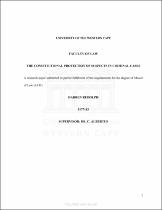| dc.description.abstract | In South Africa, the state has a constitutional duty to protect its citizens. If the criminal justice system fails to achieve this objective, then its credibility is at risk and the citizens’ rights will be negated. The South African Police Services (SAPS) is the principal law enforcement agency entrusted with the duty to ensure peace and safety in the country. However, since its formation, it has continuously been plagued by misconduct and corruption. The police are accorded certain powers that are not available to other ‘ordinary’ citizens. This includes the powers to arrest suspects. The duty to arrest presents the risk of unlawful interference with persons’ right to freedom, amongst other rights. Consequently, there is a need for clear procedures and guidance to the police on how they are to interact with civilians and exercise their powers, especially during the investigation of crimes. Policing in South Africa has become ‘difficult, dangerous and dirty work’. To boot, the challenges of the police are often considered in the light of an abysmal national crime rate and the failure of the police to provide services and deal with internal corruption. The SAPS is a hierarchical organisation, where institutional dysfunction at the top appears to trickledown to the junior ranks. According to the Institute for Security Studies, ‘political loyalty’ takes preference over competence in the police service, and unsuitable individuals are appointed into leadership positions without following due process. The SAPS have also been heavily criticised for its record on human rights violations in the execution of its duties. Some of the high profile cases of human rights violations by SAPS include the shooting of striking mineworkers at Marikana and the killing of a Mozambican taxi driver who was dragged behind a police van. Despite these human rights abuses by SAPS, accountability is widely known to be negligible in comparison to the numerous reports of impunity. To address the flaws in the police service, there should be political recognition that an adequately trained, high-functioning, ethical and accountable police service is required. | en_US |

